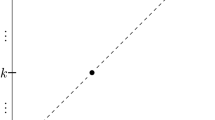Abstract
This paper analyses equilibria of voting on commodity standards within the framework of a Farrell-Saloner model which takes into consideration the trade-off between network effects and losses from a reduction of variety. Social welfare implications are derived and discussed with respect to manipulations of majority rules. The findings indicate that welfare implications of standards are highly sensitive to the decision procedure and that the choice of the decision rule is non-trivial as it can at least prevent worst outcomes if not guarantee optimal results.
Similar content being viewed by others
References
Binmore, K. (1992).Fun and games: A text on game theory. Lexington, MA: Heath.
Carlton, D.W. and Klamer, J.M. (1983). The need for coordination among firms, with special reference to network industries.University of Chicago Law Review 50: 446–465.
Dowd, K. and Greenaway, D. (1993). Currency competition, network externalities and switching cost: Towards an alternative view of optimum currency areas.The Economic Journal 103: 1180–1189.
Farrell, J. and Saloner, G. (1986). Standardization and variety.Economics Letters 20: 71–74.
Farrell, J. and Saloner, G. (1988). Coordination through committees and markets.RAND Journal of Economics 19: 235–252.
Faulhaber, G.R. (1975). Cross-subsidization: Pricing in public enterprices.American Economic Review 65: 966–977.
Fischer, D. and Schotter, A. (1978). The inevitability of the paradox of redistribution in the allocation of voting weights.Public Choice 33: 46–67.
Holler, M.J. (1984). A Public Good Index of Power. In M.J. Holler (Ed.),Coalitions and collective action, 51–59. Würzburg and Wien: Physica-Verlag.
Moulin, H. and Peleg, B. (1982). Cores of effectivity functions and implementation theory.Journal of Mathematical Economics 10: 115–145.
Roth, A. (1979).An axiomatic theory of bargaining. Berlin et al.: Springer-Verlag.
Svejnar, J. (1986). Bargaining power, fear of disagreement, and wage settlements: Theory and evidence from U.S. industry.Econometrica 54: 1065–1078.
Author information
Authors and Affiliations
Additional information
This paper has been presented at the Conference of the European Public Choice Society (1994) in Valencia and the Second Workshop in Applied Game Theory (1993) in Hamburg. We are grateful for the comments we received but have to claim sole responsibility for the resulting product.
Rights and permissions
About this article
Cite this article
Goerke, L., Holler, M.J. Voting on standardisation. Public Choice 83, 337–351 (1995). https://doi.org/10.1007/BF01047751
Accepted:
Issue Date:
DOI: https://doi.org/10.1007/BF01047751




